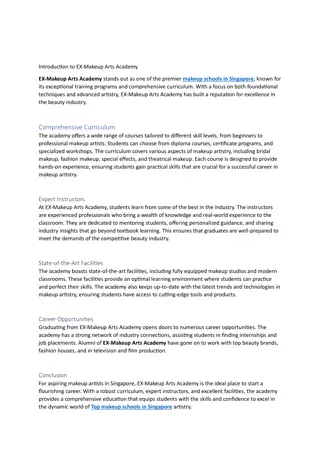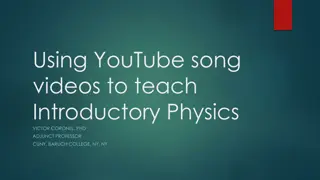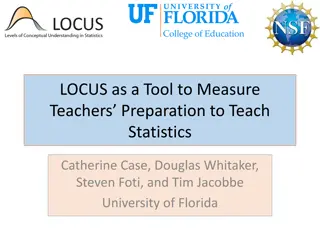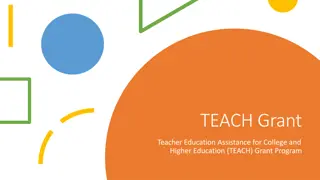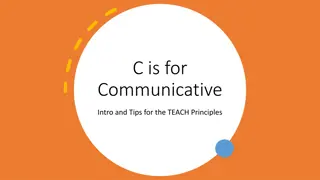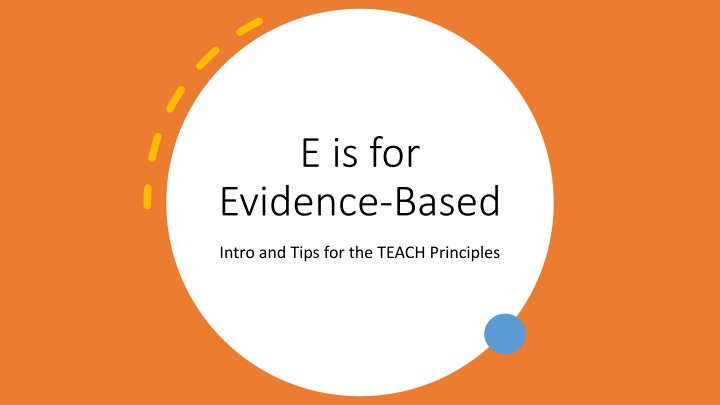
Evidence-Based Teaching Strategies and Tips for Effective Instruction
Explore evidence-based teaching strategies including active learning, classroom assessment techniques, and concept mapping to enhance student learning and retention. Learn how to apply principles of good practice in teaching for a more effective educational experience.
Download Presentation

Please find below an Image/Link to download the presentation.
The content on the website is provided AS IS for your information and personal use only. It may not be sold, licensed, or shared on other websites without obtaining consent from the author. If you encounter any issues during the download, it is possible that the publisher has removed the file from their server.
You are allowed to download the files provided on this website for personal or commercial use, subject to the condition that they are used lawfully. All files are the property of their respective owners.
The content on the website is provided AS IS for your information and personal use only. It may not be sold, licensed, or shared on other websites without obtaining consent from the author.
E N D
Presentation Transcript
E is for Evidence-Based Intro and Tips for the TEACH Principles
Developed by the Senate Teaching and Learning Committee Academic Senate endorsed spring 2022 "Principles of Good Practice in Teaching" Based in: Need for a better "definition" of good teaching Literature around best practices What are the What are the TEACH TEACH Principles? Principles?
TEACH TRANSPARENT EVIDENCE-BASED ASPIRATIONAL COMMUNICATIVE HUMANE ysu.edu/TEACH
EBTs are strategies that have been proven to: Deepen learning Increase retention Promote equity Evidence Evidence- - Based Based Teaching Teaching There are a lot of evidence-based practices, so you can find options that fit your teaching style and discipline. They can take the guesswork out of which strategies to use!
Evidence Evidence- -Based Teaching Based Teaching A few easy-to-incorporate examples: Active Learning: Freeman et al. (2014) found that just 10-15% of class time devoted to active learning has significant impacts. In a MWF course, that means as little as 5 minutes of discussion time can Classroom Assessment Techniques: These short, formative assessment activities let you gauge student learning along the way (and before they need to demonstrate!) Advanced Organizers: Advanced organizers are themes, questions, and considerations for students to engage more in homework or course readings. Can be submitted for points, used as study guides, etc. (similar to guided notes and active reading documents)
Evidence Evidence- -Based Teaching Characteristics Based Teaching Characteristics Uses a variety of student-centered strategies Designs instruction to help students see connections to prior understanding Helps students apply metacognition to their learning
Evidence Evidence- -Based Tip: Based Tip: Concept Maps Concept Maps Evidence-based strategy: scaffold knowledge or connect prior knowledge to new information If a person knew how to make a lemon meringue pie, it would be easy for them to learn how to make a baked Alaska A big difference between novices (your students) and experts (you, as instructors) is the ability to make connections between disciplinary concepts experts knowledge is well-organized Concept maps visually organize knowledge and show relationships between ideas Can be paper-based or use technology tools here Citations: TEACH site, Concept Maps, expert knowledge, mapping tools
Concept Map Example Concept Map Example Today s Goals Today s Goals Familiarize yourself with concept mapping as a study strategy. Connect key time management concepts.
Terms Im going to give you Connections with arrows Linking terms help connect ideas
Social Media Workspace Phone Schedule Habits Breaks Timer Reflection Organization Daily Goals Semester Goals Weekly Goals College Goals Tasks Prioritization Obstacles Free Time Flexibility Procrastination Sleep
DID YOU SIGN-IN? Engage with ITL 3 times this fall through workshops, book club, podcast groups, or consults and receive a $25 gift card. THANK YOU for joining us today! Before you go Complete a feedback card or fill out a feedback form online.

![❤[PDF]⚡ Escaping from Eden: Does Genesis Teach that the Human Race was Created](/thumb/21697/pdf-escaping-from-eden-does-genesis-teach-that-the-human-race-was-created.jpg)
